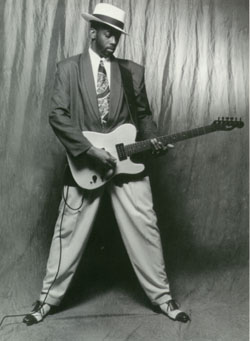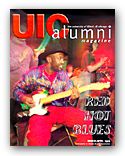
Fernando Jones, Blues Musician

Fernando Jones is a blues musician, author and playwright. He is founder of Blues Kids of America. He writer/producer/actor in the recent stage production of his book-turned-play, "I Was There When the Blues Was Red Hot!"
Fernando Jones Homepages
http://www.geocities.com/thefernandojonesshow/index.html
Review of Play by Fernando Jones
I Was There When the Blues Was Red Hot! wraps scripted lines and improvisation around some good old-fashioned, down-and-dirty blues. Not completely a "play" and not completely a blues act, what this show lacks in professional theatre finesse it makes up for in fun, drawing the audience into the action. More a character study than a history of the blues, I Was There... is a great show for blues fans and fans of interactive drama. Pretty good show. - Michael Dickerson
Author:
Jones, Fernando. I was there when the blues was red hot: a tribute to a Chicago blues family. Chicago: Fernando Jones, 1989. ML3521.J653 1989
As listed in the Chicago Public Library Collection "Chicago Blues Archives"
See: http://www.chipublib.org/001hwlc/vpablues/cbabib.html
University of Illinois at Chicago Alumni Magazine - Cover Story
March-April 1999 Issue

Red Hot Blues
by John Spizzirri '87
Fernando Jones '87 doesn't smoke. His bright, clear eyes don't reflect late nights spent drinking too many shots of Jack Daniels. In fact, you'll find him at the bar drinking juice, straight up. His name doesn't command that same gritty quality possessed by the likes of Howlin' Wolf, Magic Slim or Hound Dog Taylor. Hell, he's even got a college degree.
Yet, despite these shortcomings, Jones still considers himself a bluesman, a label he wears with dignity and respect.
And far from being an elder statesman of the blues, or even a well-known statesman, Jones preaches the blues gospel wherever he can and to whomever will listen.
He has recently held captive audiences through his roles as founder of Blues Kids of America, and as writer/producer/actor in the recent stage production of his book-turned-play, "I Was There When the Blues Was Red Hot!"
His accomplishments and credentials tell you he's everything the blues aren't supposed to be. His history tells a different story.
Jones grew up on the South Side of Chicago, the youngest child born to parents moved from Mississippi. He remembers himself as a creative kid, interested in drawing and in music. He started picking at the guitar by the age of four and got his own when he turned six. He even remembers the date: February 6, 1970.
He was never taught about the blues. It is as much a part of his identity as catfish fries on Friday nights and chit'lin's and collard greens on Sundays. And always, the fuzzy sound of blues and soul music emanated from the background.
"I wish I had some sort of a story, like, 'I was walking down the street and I hated the blues, but then I heard a Muddy Waters record blaring out of a speaker ...' But I don't have that kind of story, the blues has always been there," he says.
"I was just lucky to be born and raised in Chicago, and not have ignorant parents that cut you off from your heritage and culture."
Jones did all the things a regular kid does growing up, yet all the while earning a front row education in the blues. His older brother toured the local blues circuit as Foree Superstar, playing such legendary but now defunct haunts as the Queen Bee and Theresa's Lounge, a name that would figure prominently in Jones' own career.
In the meantime, cousin Walter Williams was making a name for himself as a great blues guitarist. Under the stage name Lefty Dizz, Williams fronted the early solo efforts of Junior Wells and often sat in with Hound Dog Taylor and the Houserockers and Magic Slim and the Teardrops.
Along with Williams came a circle of artists that became regulars in Jones' life. Later, some of these same men would become important benefactors, responsible for the way he conducts himself everyday and in the business of the blues.
What were or would become legendary names in blues history were just friends, extended family, who occasionally tossed a young guitar player a quarter.
"I'd hang out in front of the cars on those hot summer days as a child and a teenager listening to them rap and signify and chase cutie pies," Jones recalls.
And it never occurred to anyone that Foree's little brother, Dizz's cousin, would become a blues player. The subject was never broached by his older counterparts, and Jones never approached them to learn a chord change or borrow a riff.
A self-taught musician and "student of American music," Jones' influence strayed beyond the foundations of electric-based Chicago blues. The diversity of Chicago was reflected in its radio stations, giving Jones access to everything from WVON soul to WLS rock radio. And '70s television shows like Don Kirshner's Rock Concert, Midnight Special and Soul Train became a new medium to promote music from around the world.
"I think what stifles the blues, particularly among black bluesmen, is they're so hung up on paying homage to people all the time instead of creating something for the next generation to build on.That's why I do all original music now. It's not because I'm trying to be different, that's just who I am."
It wasn't until his college years and later that Jones would come to look on these figures as something more than friends and family.
As a student at UIC in the mid-1980s, Jones produced several successful blues festivals, booking his brother, old friends like Buddy Guy and Junior Wells, Koko Taylor, Muddy Waters, Jr., and his own band.
One white classmate in particular, enthralled by the news that Jones knew these artists, helped spur Jones' own appreciation for the contributions they'd made to both blues and popular music.
They were no longer just "cats from 43rd St." They were heroes among young white audiences and revered by legendary blues rockers like Eric Clapton and the Rolling Stones. By the early '90s, Jones would became reacquainted with Dizz and Junior Wells on a more intimate level. Now a man in his late 20s, he was their contemporary, a bluesman. Where they hadn't taught the young Jones about music, they provided the older Jones with lessons on the business of music.
"And all these guys—Junior Wells, Dizz, Willie Dixon; they took me under their wing before they died, so it was a great honor," says Jones.
And all these things came back to Jones one night in 1998 as he pulled up to the Checkerboard Lounge on East 43rd St. An enduring fixture in the Chicago blues scene, the club often played host to some of the most enduring names in music.
None of them would be there that night.
If ever there were a time to pay homage, this was it, Jones thought, an opportunity to let people know these artists he called friends, a chance to tell the story of a lost moment in Chicago blues history.
He'd started that process in his book "I Was There When the Blues Was Red Hot!," published in 1990.
And he'd begun to record that history on film for a black and white documentary of the same name with director David "DP" Carlson, to be released in the next year or so.
Jones borrowed scenes and moments from his earlier works, drew upon conversations he recalled and breathed new life into old friends to create a play about the blues life that holds just as true today as it did during the 1960s and '70s. He even portrays the stereotypical characters associated with that scene—the moochers and players, the tough-talking women and musician wannabes.
True to form, the music is original, but the setting is wholly authentic. Unable to get a "legitimate" theater to produce the play, Jones staged it on his own against the historical backdrop of Gerri's Palm Tavern at 446 E. 47th St.
Palm Tavern owner "Mama Gerri" Oliver, who once played host to giants in jazz and blues, had watched her neighborhood—and her business; decline since the close of the nearby Regal Theater in 1973.
Though set today, Jones' production brings back memories of better days for Mama Gerri, as well as customers both black and white. And Jones revives local characters like T, based on Theresa Needham, owner of the famous Theresa's Lounge, a bar not much different in atmosphere than the Palm Tavern.
Big Flo is inspired by his brother Foree, and the fast-talking, hip-grinding character J.B. is a thinly disguised Junior Wells.
Jones saved the part of "Dizz," for himself. It is a character he knows well, both as cousin and mentor, but also as something more.
The real Walter "Lefty Dizz" Williams set the stereotype of the black bluesman on its ear. Williams graduated from Southern Illinois University and served in the U.S. Air Force during the Korean War. He was a living paradox; he was an educated bluesman.
"It's sad that people think that blues guys are supposed to be ignorant and myopic, not be able to do but one thing or even half of a thing. And if you can do more than that, you're supposed to be less," says Jones.
But Jones doesn't heed that view any more than his cousin did. He's too busy teaching the next generation of bluesmen and -women through his Blues Kids of America program; consulting Ph.D. students about the blues; and finding new avenues for his creativity.
Most of the legends are gone now, the folks who made electric blues famous, especially here in Chicago. But the music endures, carried on by black and white musicians alike. Many still pay homage to the masters, others live the blues on their own terms, just like the cats on 43rd St., just like Fernando Jones, educator, artist, author and playwright, brother of Foree, cousin of Dizz - bluesman.
See Story at http://www.uiaa.org/chicago/Ctxt299a.htm